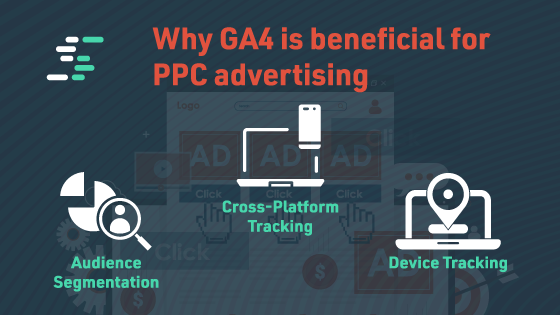In the rapidly evolving digital marketing landscape, mastering the tools that track and analyze your advertising efforts is crucial. Google Analytics 4 (GA4) is the next generation of Google’s analytics tool, designed to provide deeper insights into user interactions.
For those managing Pay-Per-Click (PPC) campaigns, understanding how to leverage GA4 can significantly enhance your strategy and improve the outcomes of your ad spend. This guide will walk you through the benefits of GA4 for PPC advertising and how you can utilize its features to boost your campaigns.
Understanding Google Analytics 4
Google Analytics 4 represents a shift from session-based data collection to an event-based model that gives a more comprehensive view of how users interact with online content across devices. Unlike its predecessor, Universal Analytics, GA4 is built to handle the privacy-first world with or without cookies, providing a robust solution to modern tracking challenges. This new model enables marketers to gain insights based on user-centric data, which can be incredibly beneficial for PPC campaigns.
Enhanced Measurement and Tracking
One of GA4’s key features is its ability to track and measure various user interactions automatically without additional setup. This includes scrolls, outbound clicks, site searches, video engagement, and file downloads—all of which are crucial for understanding the effectiveness of PPC ads. By analyzing these interactions, advertisers can better understand the user journey and optimize their ads to target more relevant audiences.
Cross-Platform Tracking
In the digital age, consumers engage with content across multiple platforms—browsing on desktops, shopping on tablets, and interacting via smartphones. This varied digital footprint poses a challenge for PPC advertisers who need to track the effectiveness of their campaigns across different environments. GA4 addresses this challenge through its robust cross-platform tracking capabilities.
With GA4, advertisers can track a user’s journey through different platforms and devices, cohesively linking those interactions. This provides a unified view of how each touchpoint contributes to user behavior and ad performance. For example, if a user clicks on an ad on their mobile device but completes a purchase on a desktop, GA4 can track that entire journey, attributing the conversion correctly across devices. This level of insight is invaluable for optimizing campaigns to ensure they are effective regardless of where or how the user is accessing content.
Device Tracking
Alongside tracking across platforms, GA4 excels in its device tracking capabilities. In today’s multi-device world, it’s crucial for advertisers to understand not just which platforms their audiences are using but also which devices they prefer. GA4 collects device usage data—whether mobile, tablet, or desktop—and provides detailed analytics that helps advertisers tailor their campaigns.
Device tracking helps identify patterns and preferences in device use, which can significantly impact ad design and placement. For instance, if a significant portion of your audience engages with your ads on mobile devices, you might prioritize mobile-optimized ad content and placements. Conversely, if desktop users convert at higher rates, you might focus more of your PPC efforts on optimizing for larger screens.
Enhanced Measurement for Device-Specific Interactions
GA4’s enhanced measurement settings automatically collect data on various interactions specific to device types, such as mobile app installs or desktop link clicks. This granular data allows PPC advertisers to refine their ads based on user behavior with specific devices, leading to more effective ad placements and better allocation of advertising budgets.
By diving deep into cross-platform and device tracking, GA4 provides PPC advertisers with the tools they need to create more effective, user-centric advertising campaigns. These capabilities ensure that regardless of how or where your audience interacts with your ads, you have the data to understand and optimize those interactions for maximum impact.
Predictive Analytics
GA4 incorporates predictive analytics, utilizing machine learning to forecast future user actions. For instance, it can predict which users will likely convert, allowing PPC managers to focus their efforts and budget on targeting high-value prospects. This predictive power helps refine targeting strategies, ultimately boosting the ROI of PPC campaigns.
Improved Conversion Modeling
The new analytics model offers improved conversion modeling through enhanced measurement capabilities that fill in the gaps where data might be missing. This is particularly useful in a world where cookies are being phased out and direct tracking is more challenging. For PPC advertisers, understanding which ads drive conversions, even when direct tracking is impossible, is vital for assessing performance and making informed campaign adjustments.
Integration with Google Ads
GA4 integrates seamlessly with Google Ads, allowing advertisers to import goals as conversions within Google Ads and use that data to optimize bidding strategies. This integration simplifies measuring ad performance and enables more dynamic and responsive PPC campaigns. By directly linking GA4 data with Google Ads, marketers can quickly see which ads are performing best and adjust their spending accordingly.
Audience Building and Segmentation
GA4’s advanced audience-building and segmentation capabilities allow advertisers to create more detailed and targeted audience segments based on user behavior. This is particularly advantageous for PPC, as it enables the creation of highly tailored ads that resonate with specific user groups. By crafting messages that are more aligned with these segments’ interests and behaviors, advertisers can improve engagement and conversion rates.
User Privacy and Data Control
Finally, GA4 is designed with privacy at its core, providing more robust data control features that help comply with regulations like GDPR and CCPA. For PPC practitioners, this means managing and deploying campaigns that respect user privacy while gaining valuable insights from the data users have consented to sharing.

Google Analytics and PPC Advertising
As PPC advertising continues to be a critical component of digital marketing strategies, leveraging the latest tools like Google Analytics 4 can provide a competitive edge. GA4 offers many features that can enhance how you track, analyze, and optimize your PPC campaigns.
By understanding and utilizing these capabilities, advertisers can drive more effective campaigns that reach and resonate with their target audiences, ultimately leading to better performance and higher returns on investment. Whether you are just starting out or looking to upgrade your PPC tactics, GA4 is an indispensable tool in your marketing arsenal.
